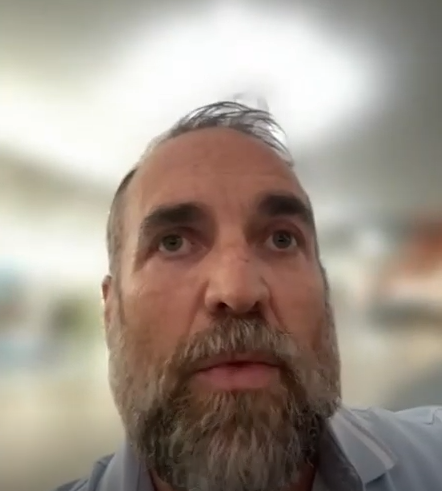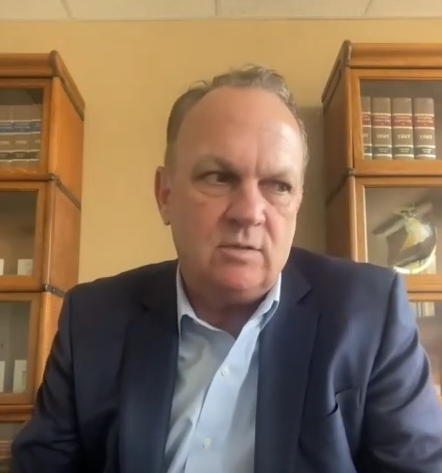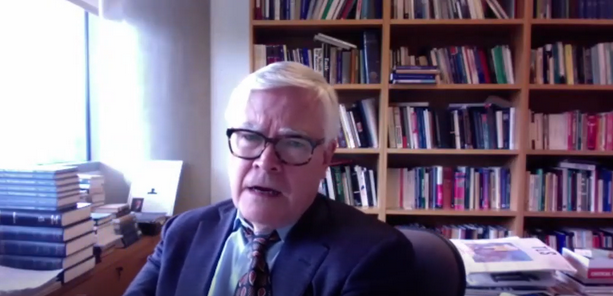The Academic, Student and External Affairs Standing Committee, a subcommittee of the Board of Trustees (BOT), met on Apr. 17 to discuss upcoming items for the Apr. 26 BOT meeting, vote on a few small amendments and discuss reports from the college. Notice of this virtual meeting was not made public until Apr. 13. Materials for the meeting were not provided to the public in advance, and still have not been provided.
Trustee and Committee Chair Mark Bauerlein began the meeting by calling roll. Those in attendance were Trustees Matthew Spalding, Charles Kesler, Jason “Eddie” Speir–who participated from what appeared to be a mall food court—Associate Professor of Computer Science and Faculty Chair Matthew Lepinski and New College Student Alliance (NCSA) President Grace Keenan.

Trustees Christopher Rufo and Ryan Anderson are also members of the standing committee but did not attend. Regardless, quorum was met. In addition to the committee members, Interim Provost Bradley Thiessen, BOT Chair Debra Jenks, Interim President Richard Corcoran, Associate Vice President Christie Fitz-Patrick and Vice President of Finance and Administration Chris Kinsley were present to provide context and answer questions on agenda items.
The committee first approved the minutes of the Jan. 23 Academic Affairs meeting, then moved on to the following agenda items.
Tenure Track
Tenure has been heavily discussed within the New College community as of late, as it was revealed in a memo from Corcoran that he requested that seven faculty members remove their applications for tenure.
“We decided to defer that discussion to next week for the full board meeting,” Bauerlein announced promptly after stating the agenda item. “Nothing will change.”
Bauerlein explained that it will be deferred to the BOT meeting on Apr. 26 in order to allow full consideration of each candidate, but asked that Corcoran elaborate on the “memo” he added to the packet of each committee member—which again, has not been made publically available. Corcoran declined, and said he would wait for the full board meeting to discuss the topic.
Keenan pressed for discussion about the tenure issue, and asked if—according to the Collective Bargaining Agreement (CBA)—the item would still be able to go to the BOT meeting on Apr. 26 if they didn’t vote on it. Corcoran assured her that they were “confident in the posture” according to the CBA, and that the item would make it to the next meeting.
Keenan also had a question about whether the documents provided in the packet sent to trustees were in accordance with the CBA.
“My understanding was that only very specific documents can be included in the packets that are sent to the trustees,” Keenan stated. “The memo from Interim President Corcoran was not part of the specific list that can be included [in this packet]. Maybe it can be included in something else. But I just wanted to be very diligent about what is and is not supposed to be included.”
Corcoran again reassured the committee that they would “go through all of that” at a later date and report back on the legality.
Tuition and Fees
For this agenda item, Keenan immediately proposed an amendment to one of the documents that the committee members had received relating to tuition, explaining the current version of the document “has Independent Study Project (ISP) meal plan as optional for commuter students.
“I just wanted to make sure it clarifies that it’s also optional for students who have fulfilled their mandatory ISPs,” she said. “And then also, it’s optional for students who have been approved for off-campus ISPs. If they’re going to be traveling for the month, they don’t need to get a meal plan.”
Keenan explained that she had already discussed the amendment with Kinsley and that he thought it would be a good idea. Bauerlein requested that Keenan provide language for the proposed amendment, which she provided in the Zoom chat and read aloud: “The language will be that the ISP meal plan is optional for commuter students who have fulfilled all mandatory ISPs and for students who have been approved for an off-campus ISP.”
Keenan moved to approve the amendment and Lepinski seconded. The motion was approved with no opposition.
Lepinski then questioned Kinsley on whether there would be enough funds to cover the meal plan scholarship for all students in the 2023-24 academic year.
“I’ll say yes, I can confirm that,” Kinsley said. “At maximum, it would be $500,000, but I don’t think it will be at maximum because students will have the benefit of other scholarships and other aid.”
Review of Amendments to the Degree Program Planning and Approval
Thiessen explained that the amendments to the regulations were a simple update to comply with the Board of Governors (BOG) standards—including a purpose statement and updated definitions, outlining the process to approve new tracks within an AOC.
“Are we just philosophically committed to a grandfathering of existing students through an older curricular program as we make revisions to the existing curriculum for incoming students?” Bauerlein asked.
“Correct. It’s not only philosophically, it’s accreditation standards,” Thiessen explained. “If we have a program that has any active students, I’d even argue, if we are recruiting students actively into a program, we have an obligation to teach that program out. However, a teach-out plan could, and this is an extreme case, but could in theory be that we are sending students to another school to complete that program. So there are options, but yeah, we are philosophically and through financial aid dollars required to grandfather students through their programs.”
The next agenda item was simply approving an amendment to make sure the College’s structure of creating new institutes and centers aligns with those established by the BOG.
Alternative Admissions
For this item, Thiessen explained that an alternative admissions process will occur for some students, if they don’t meet the traditional admissions requirements but they excel in other areas.
“The typical reason why this would happen is if a student does not have all the language requirements met to get into New College through the traditional admissions process,” he said. “So the BOT approved New College to admit up to 15% of our first-time students in this profile admit—this alternative admissions process.”
He explained that the report shows the number of students admitted in that way, retention strategies for those students and the percentages of how many students were “profile admits.” For Fall 2022, 6% of admitted students were part of this alternative admissions category, and only 22% of those admits ended up enrolling.
Thiessen also explained that the retention rate for students admitted under that category was slightly lower than other admitted students, but that because the number was so small it was hard to determine a real trend.
“My own opinion is that the difference in the retention rate to me is not significant enough to tinker with the 15% threshold,” Bauerlein said. This was met with approval by other board members.
Corcoran stated that the issue has been resources, and in the coming semester, “We’ll do a lot more in terms of having our faculty be more active, and the advising, and more focused on the future of our students. So we’ll spend money and resources and—trying to bring our retention rate for all students.”

Speir chimed in, asking the board to consider moving “the percentage up from 15 to 20% to give enrollment and admissions more opportunity to bring in and take more chances with more students with a more of, as President Corcoran was saying, more of an emphasis on retention.”
After Thiessen clarified for the board that this metric was not “based on some inappropriate changing of admissions policies” as Spalding had questioned, Bauerlein requested clarification on a sentence: “It’s the second sentence about the latter part of many students that may contribute to a representative and diverse student body. What does that mean?”
The full statement in question is this: “The alternative admissions options is an option for admission of an applicant who does not fully meet minimum admissions requirements but who has special attributes, special talents, or unique circumstances that may contribute to a representative and diverse student body.”
“That comes from the BOG’s language and their regulation,” Thiessen responded. “It might come from our own. I’ll check.”
“I would move that we strike that entire phrase and end with that sentence,” Bauerlein proclaimed.
“I don’t have issue with that language as I understand it,” Corcoran said. “If we could move forward, we can always come back and address that language because this is bringing us into compliance with the BOG.”
Discussion ensued where various trustees asked for clarification of the definition and context of the word, “representative.”
“The alternative admissions options is an option for admission of an applicant who does not fully meet minimum admissions requirements but who has special attributes, special talents or unique circumstances that may contribute to a ‘representative and diverse student body,’” Bauerlein responded. “It’s just in the opening background statement. What does representative mean right there?”
“I found the BOG regulations,” Thiessen said. “These factors may include but are not limited to the following: a combination of test scores and GPA that indicate potential for success, improvement in high school record, family educational, background, socioeconomic status, graduation from a low performing high school, graduation from an International Baccalaureate Program, geographic location, military service, special talents and or abilities or other special circumstances. They shall not include preference in admission based on race, national origin or sex.”
Bauerlein and Spalding both requested that the New College document use this same language used by the BOG instead. Thiessen explained that they would have to write up an amendment of their regulations and bring it to the BOT for a vote.
Bauerlein explained that, “I may not be as concerned about getting the retention rate above 80, 85% as others. I think that given the demands of the New College model that we might reasonably expect a somewhat lower retention rate than we see in other Florida public institutions.”
To which Corcoran agreed, explaining that we shouldn’t compare New College to other universities using an “apples to apples” comparison. Corcoran then proceeded to give data on the incoming class.
“Right now, we’re at about 100 students enrolled. It’s a little bit down, but we just got another 150 applications, which is very strong. We’ve gotten 150 kids that we’ve admitted just in the last few weeks.”
As the meeting ended, Lepinski commended the Admissions staff—letting his fellow trustees know what work they’ve done.
“ Last Friday and Saturday [Apr. 14 and 15], I spent time assisting faculty participation in admissions events,” Lepinski said. “And the work, the professionalism, the effort that our Admissions team is putting into really bringing us home for the admitted class of fall 2023—it’s really incredible. We’ve got Admissions firing on all cylinders. And I just wanted to make sure that all of my colleagues on the board were aware of the great work that our staff is doing in that area.”
Bauerlein reminded the attendees that what he referred to as the “accelerated tenure case” would be taken up at the next BOT meeting on Apr. 26. He thanked everyone for attending and the committee concluded its meeting.

